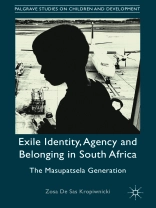This book examines the experiences of 49 second-generation exiles from South Africa. Using “generation” as an analytical concept, it investigates the relational, temporal and embodied nature of their childhoods in terms of kinship relations, life cycle, cohort development and memory-making. It reveals how child agents exploited the liminal nature of exile to negotiate their sense of identity, home and belonging, while also struggling over their position and power in formal Politics and informal politics of the everyday. It also reflects upon their political consciousness, identity and sense of civic duty on return to post-apartheid South Africa, and how this has led to the emergence of the Masupatsela generational cohort concerned with driving social and political change in South Africa.
İçerik tablosu
Chapter 1: Introduction.- Act I: Exile.- Chapter 2: Roots and routes of exile.- Chapter 3: The emergence of a generational cohort- Chapter 4: Care and protection in the liminal spaces of exile.- Chapter 5: Home, identity and belonging.- Act II: Return.- Chapter 6: Introduction.- Chapter 7: The meeting of myths and reality.- Chapter 8: Identity and belonging in post-apartheid South Africa.- Chapter 9: Obligations and agency in post-apartheid South Africa.- Chapter 10: Conclusion.
Yazar hakkında
Zosa De Sas Kropiwnicki is a Senior Research Associate in the Department of Anthropology and Development Studies at the University of Johannesburg, South Africa.












